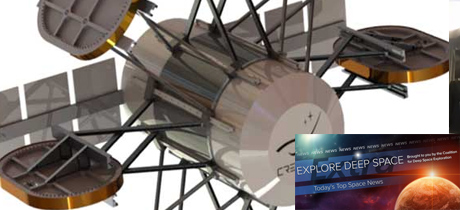In Today’s Deep Space Extra… The U.S. House has advanced an omnibus appropriations bill for the 2022 fiscal year that includes an increase in NASA funding from FY2021. The U.K. bans aerospace exports to Russia.
Human Space Exploration
NASA to get $24 billion for FY 2022, more than last year but less than Biden wanted
Spacepolicyonline.com (3/10): The U.S. House late Wednesday passed an omnibus appropriations bill for the 2022 fiscal year that began last October 1 along with a Continuing Resolution (CR) that will prevent a shutdown of federal agencies, including NASA, effective from Friday through March 15. The latest in a series of CRs should give the Senate time to vote on the omnibus appropriations bill that emerged from House and Senate appropriators on Wednesday. The omnibus provides NASA with $24.041 billion for the 2022 fiscal year that extends through September 30, 2022. That’s a $770 million increase over 2021, but $760 million less than requested by the White House.
NASA funds research into magnetic field to protect astronauts in deep space
Parabolicarc.com (3/9): As part of a series of NASA Innovative Advanced Concept (NIAC) grants awarded recently, a University of Wisconsin researcher will explore a technology that establishes a magnetic field around a spacecraft capable of shielding astronauts from the health risks posed by solar and cosmic radiation in deep space. The project, designated the Cosmic Radiation Extended Warding (CREW) using the Halbach Torus (HaT), is valued at $175,000.
Space Science
How did Earth go from molten hellscape to habitable planet?
Universetoday.com (3/9): A pair of Caltech and Yale university researchers have attempted to address a mystery: how the Earth transitioned from a molten spheroid early in the history of the solar system to a rocky planet with a habitable atmosphere. For the heat to disburse so did the prevalent level of carbon in the atmosphere over a 600-million-year period. Much of the carbon transitioned to rock formations, part of a complex transformation described in research published in the journal Nature.
Other News
Space programs moving up on DoD’s budget priority list
SpaceNews.com (3/9): Speaking on Wednesday before the McAleese & Associates’ annual defense programs conference, Pentagon controller Mike McCord predicted funding for space programs will grow annually to support an increased reliance on satellite operations. The DoD’s yet to be released 2023 budget proposal will reflect a call for more resilient space capabilities, according to U.S. Air Force Secretary Frank Kendall, who also addressed the conference. “It will likely take several years to identify the specific requirements and secure funding,” Kendall said. “We have a long way to go and there’s a bill coming. I do see tough choices ahead as we define the things we need.”
U.K. bans space-related exports to Russia
SpaceNews.com (3/9): U.K. Foreign Secretary Liz Truss on Wednesday announced sanctions aimed at Russia’s space sector in response to Russia’s military incursion into Ukraine. New measures will impose sanctions on U.K. exports of aviation or space-related items and technology to Russia, including related services such as insurance and reinsurance services, according to the announcement.
Former NASA astronaut Scott Kelly giving back Russian spaceflight medal
Space.com (3/9): As part of his protest against Russia for its invasion of Ukraine, retired NASA astronaut Scott Kelly, who set a record of 340 days for the longest U.S. human spaceflight in 2016, is returning his Russian medal “For Merit in Space Exploration.” “Please give it to a Russian mother whose son died in this unjust war. I will mail the medal to the Russian embassy in Washington, Good luck,” Kelly told Dmitry Medvedev, who currently serves as deputy chairman of Russia’s security council.

